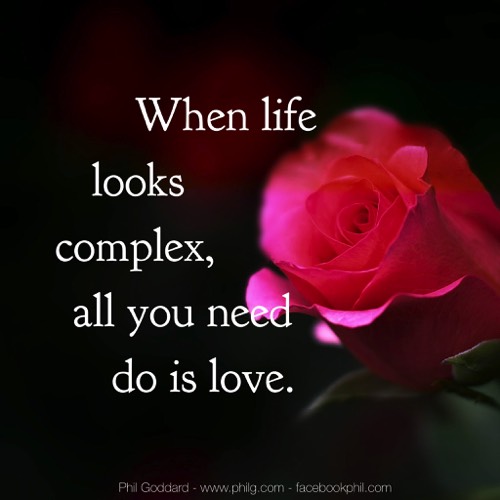The Illusion of Complexity

But I notice some people like to have life be complex, have things mean things, about themselves and about life, live with many rules, meanings, definitions, and conditions. That's not for me. I don't often entertain that level of self-importance.
That’s not to say I don’t respect other’s rules for life. As someone who habitually inhabits the Enneagram at point 9, not wanting to upset the apple cart is my forte. Unconsciously, I’ll often agree to anything for peace.
I still believe it's important and helpful to establish and agree upon the nature of any relationship, what is acceptable and what is not. In fact, it is in agreeing these terms that complexity is reduced and love is able to flow unabated, and expressed in agreed and appropriate ways. Life is all-in-all easier within simple agreements rather than navigating complex expectations.
If I’m willing to understand it is never the intention of my partner, or indeed anyone else with whom I have any kind of relationship, to have me be pissed, if I am willing to trust their love for me, when I catch myself feeling pissed it's a good indicator I am not understanding them.
Byron Katie says if you're not feeling love you're confused.
And that makes sense, since love is our true nature. Babies are often described as a bundle of love, without all the conditioning they are subjected to during the rest of their life. Things remain pretty simple for babies and young children.
Then sadly and very quickly we develop the habit of meaning and prediction. We start believing that because things have happened to us once, they will happen again in the future if we allow them. We develop our mental triggers that warn us “here it comes, that thing you predicted would happen again!” But very often our ability to predict the future via those triggers is appalling. And so our system becomes yet more complex as we try to get even better at our predictions.
Phew! I’m tired just trying to explain that! Such hard work, resisting love. Where is the love? Hidden behind all those fear-created rules, triggers and complexities.
I’ve often talked with friends about their relationships and concluded “It doesn’t have to be hard work.” No relationship needs be hard work. I don’t even subscribe to the “relationships have to be worked at” ethic, since if you come from a loving place, it is effortless. Part of that love is a knowing and trusting that your partner loves you too.
I love you. I can't not love you, despite what my own ego or indeed your ego might have to say on the matter. And I’m willing to believe the same of you.
If all behaviours are either an expression of love, or call for love, an appropriate response to any behaviour is always love.
When I’m pissed and my relationships feel complex, I’ve likely forgotten that.
